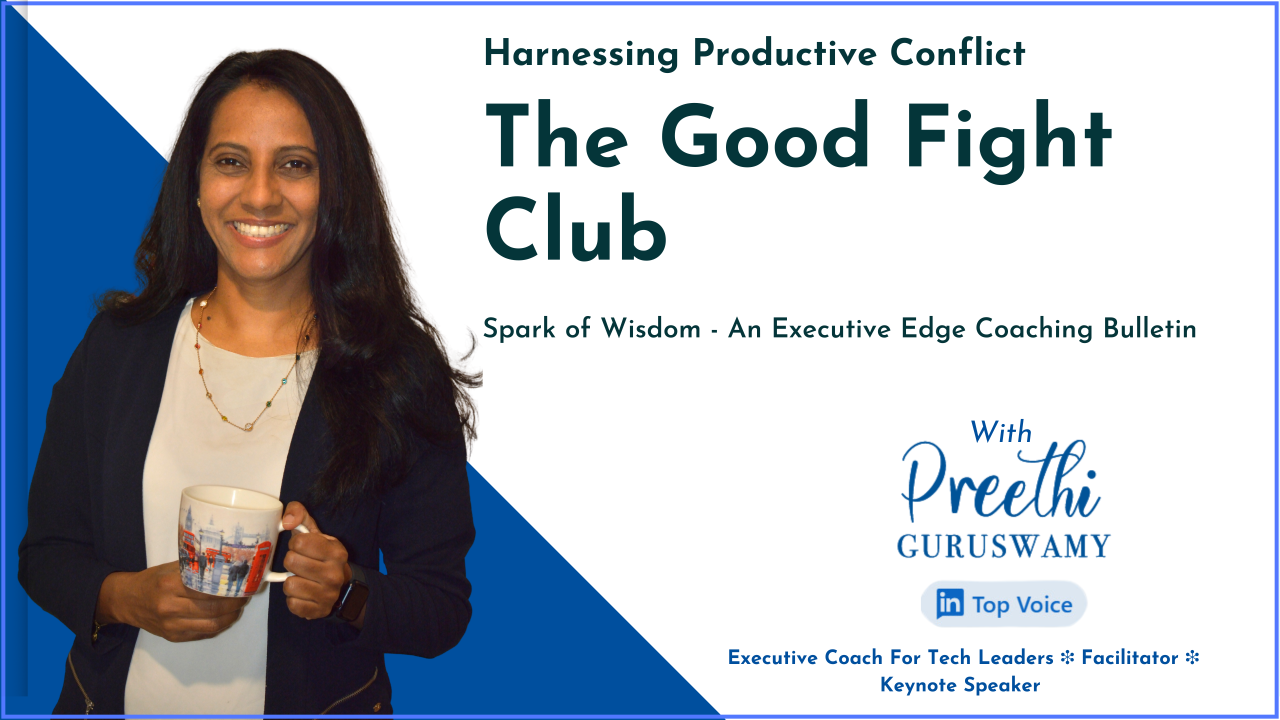
The Good Fight Club - Harnessing Productive Conflict
Preethi Guruswamy - Executive Coach for Tech Leaders
Empowering tech leaders to achieve breakthrough results ? Founder & CEO- Vision of Wisdom, Lean In Network -Women In Tech India ? Keynote Speaker ? Leadership Facilitator ? LinkedIn Top Voice 2024
Conflict is often seen as a negative force in relationships and teams. However, when managed effectively, conflict can be a powerful catalyst for growth, innovation, and high performance. There are two main types of conflict as Adam Grant say in Think Again: relationship conflict and task conflict.
Turn disagreements into driving forces for innovation and growth.
Relationship Conflict
Relationship conflict arises from interpersonal differences, such as personality clashes, communication styles, or values. This type of conflict can be destructive if not addressed effectively. It can erode trust, create a hostile work environment, and hinder collaboration.
Task Conflict
Task conflict, on the other hand, is focused on the work itself. It arises from disagreements about goals, tasks, or procedures. This type of conflict can be constructive if it is managed effectively. It can lead to better decision-making, increased creativity, and improved problem-solving.
The Importance of Productive Conflict
The absence of conflict does not necessarily indicate harmony. In fact, a lack of conflict can often lead to apathy and stagnation. As psychologist Robert Albert notes, “The creative person-to-be comes from a family that is anything but harmonious, one with a ‘wobble.’” Disagreeable people tend to be more critical, skeptical, and challenging, which can be beneficial for innovation and problem-solving.
High-Performing Teams and Conflict
High-performing teams are able to navigate both relationship and task conflict effectively. They have established norms for constructive conflict, such as:
The Benefits of Productive Conflict
Beyond fostering innovation and creativity, productive conflict can also:
Why Conflict Matters?
As a senior leader, you’re no stranger to high-stakes decisions, strategic planning, and navigating complex landscapes. Here’s why embracing healthy conflict matters:
The Power of a Challenge Network
In our professional lives, we often seek out supportive networks—people who encourage us, cheerlead for us, and provide a safety net. These agreeable connections are essential for emotional well-being and camaraderie. However, there’s another type of network that deserves equal attention: the challenge network.
领英推荐
What Is a Challenge Network?
A challenge network consists of individuals who play a different role. They are the skeptics, the devil’s advocates, and the fearless questioners. Here’s why they matter:
Conclusion
So, don’t shy away from the occasional clash. Your creative muscles thrive in the friction. Stand up for your convictions, listen actively, and let healthy conflict propel you toward breakthroughs. Remember, it’s not about winning; it’s about evolving.
Next time you’re in a heated debate, channel your inner architect. Build bridges, not walls. And when the dust settles, you’ll find innovation waiting on the other side. ???
??Ignite Your Executive Vision - Innovate, Elevate & Impact.
Share the Spark! ? Share this newsletter with your network and help others ignite their leadership journeys.
Ready to Elevate Your Leadership? I'm here to support you!
#SPARKOFWISDOM: I invite you to share your thoughts and experiences in the comments below.
About me: ?? I'm Executive Coach for Tech Leaders and I specialize in building high-performing teams through personalized coaching programs and leadership journeys. I partner with senior leaders and HR business partners to create thriving organizations where individuals flourish, collaborate effectively, and achieve remarkable results.
Connect and collaborate??: Let's discuss your leadership development journey and team coaching needs. Together, we can design a program to propel your organization towards success!
I'm rooting for your success.
Aspiring HR Leader | HR Professional @ Sub-K IMPACT Solutions Ltd | Experienced in Fintech | Eager to Explore Learning & Development | Content Creator
1 个月Well said Preethi Guruswamy - Executive Coach for Tech Leaders Turning conflicts into opportunities for growth is a game changer for any team.